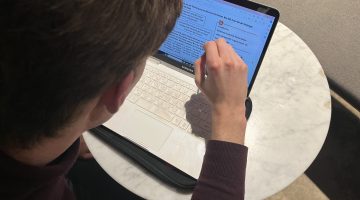Who hasn’t experienced it? You call your family doctor about a complaint, but no one answers the phone. Appointments can only be made several months in advance – if you are lucky. This often results in frustration, not only for patients, but also for doctors and specialist staff. Especially the latter get to feel the patients’ frustration and anger at first hand. Of course, the practices do not do this on purpose. There is a shortage of qualified staff all over the country, so that often there is no one to take calls and make new appointments. In order to draw the attention of patients and, above all, politicians to this emergency, many professionals in surgeries stopped working for an hour today, Wednesday 11 January.
Why did this protest happen?
The shortage of skilled workers was already present before the pandemic, but it has come to the fore especially because of the pandemic. Not enough specialists are being trained and practices are already having to cut the number of appointments and treatment times for this reason. The Northern Doctors’ Cooperative therefore called for a protest action and many practices in Schleswig-Holstein followed suit. Twenty percent of the 3,000 practices participated in this protest. In Kiel, professionals in many places stopped working from 11 am to 12 pm.
“We have unfilled positions, would also like to train new staff this summer, […] we don’t have any yet. And that is really a big problem, the shortage of specialists,” said Dr Olav Schaefer, a general practitioner in Kiel, in an interview with NDR.
In some GP practices there are just as many specialists as doctors, but ideally there should be twice or three times as many. Only then can the practice run smoothly and accept new patients.
The demands of the Northern Medical Chamber
The shortage of specialists will not realistically change overnight in the next few years. However, the Northern Medical Chamber is calling for concrete structural changes. For example, more medical study places should be created in Schleswig-Holstein. In the winter semester of 20/21, there were approximately 4,525 medical students (general medicine and dentistry) in the entire state. This number should be increased significantly.
There are also calls for an increase in fees and a reformation of the financial system to keep both doctors and professionals in the profession.
Politicians have taken note of the protest and the necessity of the shortage and have shown understanding. The Minister of Health, Kerstin von der Decken (CDU), was particularly positive about the demand for more study places. In the future, medical courses in Schleswig-Holstein are to be expanded.
Only time will tell whether and to what extent the demands will actually be met and whether the critical situation will calm down somewhat in the next few years. What is certain, however, is the urgency of the situation, which was made clear once again by today’s protest.
![FHews – [ fju:s]](http://fhews.de/wp-content/uploads/2015/05/fhews_logo2_3B8ACC.jpg)









No Comment